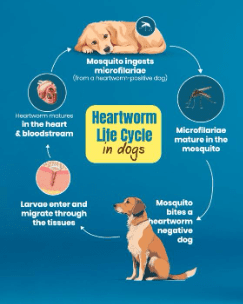Transmitted by seemingly harmless mosquitoes, heartworm disease is far from harmless. Heartworm disease is a parasitic disease that can quietly invade your dog’s body and grow and multiply until it wreaks havoc on their hearts, lungs, and blood vessels. The scary part is many dog parents don’t even realize their dog is infected until symptoms become severe. However, with the right knowledge and timely action, this condition can be treated and prevented.
In this blog, you’ll learn just that. We’ll cover the fundamentals, signs to watch for, and the diagnosis and treatment of heartworm disease in dogs. Moreover, we’ve also included preventive measures, such as using trusted products like Heartgard Plus for Dogs, to help keep your dog safe, healthy, and heartworm-free.
Let’s dive right in!
What is Heartworm disease in dogs?
Heartworm disease is a potentially deadly parasitic infection caused by a parasitic worm called Dirofilaria immitis. They are transmitted through the bites of infected mosquitoes, which carry the immature heartworm larvae.
These immature larvae live and grow inside the dog’s body. If not treated in a timely manner, they can enter the dog’s heart, lungs, and blood vessels, causing various health issues.
How Do Dogs Get Heartworm Disease?
Heartworm disease is transmitted by the bite of an infected mosquito. About 70 species of mosquitoes can transmit heartworm disease in dogs. When an infected mosquito bites a dog for a blood meal, it injects the heartworm larvae into the dog’s bloodstream. The larvae quickly find their way to the heart, lungs, and arteries and can grow up to 12 inches in length.
These spaghetti-like worms can live up to 7 years inside the dog and mate, producing millions of microscopic microfilariae. Over time, they die and begin to clog the heart, lungs, and arteries, causing damage and impairing the organ’s normal functioning. If left untreated, they can cause several health issues and may eventually lead to death.
When a mosquito feeds on a dog carrying microfilariae, it becomes the host and can further transmit the parasite to other dogs, continuing the cycle. However, the disease does not transmit directly from dog to dog, as it requires mosquitoes to be the intermediate host.
What are the Common Symptoms of Heartworms in Dogs?
These are the signs that will help you identify heartworm disease in dogs:
- Cough
- Weight loss
- Decreased appetite
- Lethargy
- Shortness of breath
- Swollen abdomen
- Exercise intolerance
- Fainting
If you notice some or all of these symptoms in your dog, promptly contact your vet and book an appointment for further diagnosis.
How is Heartworm Disease Diagnosed in Dogs?
To diagnose the presence of heartworms in dogs, the vet first does a physical examination to understand the symptoms. They’ll take a blood sample for the following tests:
Antigen test: This test is done to detect the presence of adult female worms in your dog’s blood.
Microfilaria test: As the name suggests, this test is done to determine whether your dog’s blood contains heartworm larvae (microfilaria) or not.
Depending on the results of these tests, the vet designs the treatment and recovery plan.
Treatment of Heartworm Disease in Dogs
Typically, the treatment of heartworms in dogs starts with taking steps to eliminate all stages of heartworm from the dog’s body. For that, the vet may prescribe a suitable dose of doxycycline, an antibiotic that helps weaken the adult heartworms. Then, a dose of melarsomine is given, which helps eliminate the adult worms.
Another part of the treatment includes controlling and reducing the symptoms. For that, the vet will recommend heartworm prevention treatments to prevent further infestations. Furthermore, to cater to other symptoms, flea and tick treatment or anti-inflammatory treatments may also be recommended.
Measures to Prevent Heartworm Disease in Dogs
Practice the following preventive measures to keep your dog out of the dangers of heartworm disease:
- Visit your vet regularly for timely check-ups.
- Maintain a regular grooming routine.
- Reduce your dog’s exposure to mosquitoes.
- Avoid water standing nearby to prevent mosquito breeding.
- Consult your vet and administer heartworm prevention treatment to your dog.
- Also, administer suitable flea and tick treatment after consulting your vet.
- Use pet-friendly mosquito repellents.
- Avoid outdoor activities during dusk or dawn, when mosquitoes are most active.
The Bottom Line
Heartworm disease in dogs is a serious condition, but with the right knowledge and care, it’s easily manageable. Put the information covered in this blog to good use and ensure your pet’s safety against the dread of heartworms. Stay alert, act early, and give your pup the protection they deserve.
































